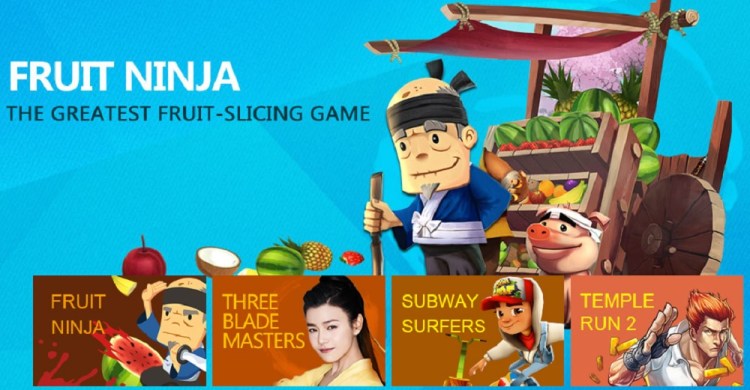Jeff Lyndon is the cofounder and executive vice president of iDreamSky, the largest mobile games publishing platform in China. Market researcher Newzoo expects China to overtake the U.S. as the world’s biggest games market by 2016 with $25 billion in revenue, according to market researcher Newzoo.
But navigating the Chinese mobile game market, with dozens of Android app stores and other distribution channels, isn’t easy. Lyndon’s Shenzhen-based company specializes in taking successful mobile games and publishing them in the Chinese market, after localizing them for traditions and tastes. It has a portfolio of more than 80 games today. It has formed alliances with companies such as Tencent, Baidu, and Beintoo.
To date, the Company has distributed worldwide blockbuster hits such as Temple Run, Fruit Ninja, Subway Surfers, Cookie Run, Doodle Jump, Brizzle, and Asphalt. The company has raised $10 million from Redpoint Ventures and Legend Capital. iDreamSky has several hundred employees in offices in Hong Kong, Beijing, Chengdu, Nanjing and America. We talked to Lyndon recently about publishing in China and the upcoming ChinaJoy game trade show in Shanghai. Here’s an edited transcript of our interview.
GamesBeat: Could you tell me about the history of your company, and what’s currently going on for you?
Jeff Lyndon: We were founded in 2009. Currently we have more than 400 employees in China. We’re working on being the leading mobile game publishing platform in China. We work with many top companies around the world, including Gameloft, Ubisoft, Halfbrick, and many more. We help them bring their games to China. We started the company as an outsource developer, myself and the other co-founders, Michael and Anthony. We didn’t really know what to do at the time. We just knew that smartphones were the next thing. After a year of doing outsourcing in China for Android device manufacturers and telecoms in Taiwan, we built an app store — a third-party Android app store. That became a very big business for us.
Fast forward to 2010, though, and we decided that it wasn’t really what we wanted to do. Because we had built this successful app store, we had built relationships with a lot of developers. In those days, one of the biggest problems for mobile content developers was that because there were so many app stores, it was hard for them to distribute across all of them. We decided to be a mobile game distributor for a lot of these companies. In 2011 we had our first big hits. We started distributing Fruit Ninja, and shortly after that, we distributed Angry Birds. We still work with Halfbrick to this day.
At the end of 2012 we started asking ourselves another question. It seemed like the stores were consolidating, and billing was also consolidating. Distribution was getting worked out. Fewer and fewer stores were important – maybe 200, down from more than 1,000. Of those 200, only 20 really mattered in terms of download volume and revenue. However, you still needed to get on all 200 to combat piracy and unauthorized distribution. We realized this consolidation was going to keep happening, and when that happened, the surviving storefronts would become publishers too. We wouldn’t have any more leverage just being a middleman that helped with distribution to all the app stores.
At the same, we also realized that a lot of international game companies wanted to distribute their games in China. In 2011 and 2012 that was pretty easy, because they had such high-quality games compared to the local products. By the end of 2012, though, we started to see much better games coming from Chinese developers, games that were more adapted to the local culture in China. Because they didn’t need to localize, they could update much faster than international games.
The way the model worked in 2012, the publisher would say to the developer, “To sell your game in China you need to change this and change that,” and they’d take time making those changes. That model isn’t competitive anymore. We started talking to developers about our new publishing program, where instead of asking developers to create localized content, we have them license their games to us.
That sounds simple enough, but the problem is, if we’re going to develop localized content for a developer, we need access to all of their software. A Chinese company getting a developer’s source code is a big worry for most companies around the world. Most developers won’t give their source code to anyone. But in 2013, we proved to our partners that by doing that, by letting our teams develop their updates and maintain their games, it’s a far more efficient process. You get much better results.
Now, 95 percent of our partners provide us with source code and have us do all their development in China. That makes iDreamSky a very special company. We’ve become a very trusted company in China. Right now, we do all the Chinese updates for Temple Run. We’ve helped them optimize the game for the Chinese market. We’ve help them make their game consume less bandwidth. We’ve added content for Chinese holidays. We’ve added Chinese characters. We’ve remapped their monetization so it works better for local consumers. We’ve changed the billing system so you can use direct SMS billing or online billing.
GamesBeat: You’ve seen the industry grow at ChinaJoy in Shanghai. Can you describe it?
Lyndon: This year is a big year because it’s the first time the mobile game industry will have its own expo center. It is huge. It’s also a big year because the overall Chinese games market has grown so large, and the consoles are finally launching in China too.
GamesBeat: Would you say you do less actual localization, then? You’re not necessarily doing a lot of the changing of the content?
Lyndon: Our publishing service includes localization. Localization is the bare minimum that any publisher should be doing in China – adding Chinese language, doing content for the Chinese new year, lending more Chinese cultural themes to the game. There are three types of localization, I’d say. The first type is just translating the game, the most basic mode that calls for the least amount of time. The second layer of localization is the cultural element, adding the bells and whistles, adding Chinese characters into the game, making the universe feel more Chinese.
But I think there’s also a third level of localization, which is something that we’re providing in the Chinese publishing market. We provide technical localization. If you look at Chinese user behavior, the Chinese distribution ecosystem, your application needs to adapt to these situations. It’s a very fragmented market. You need a system in place to track all these channels of distribution, so you can have more accurate strategies for distributing your app in China.
For example, the majority of users in China are still on 2G. Some are on 3G and a very few are on 4G. In this kind of environment, your game needs to be designed to download and play with that in mind. In the U.S., everyone has 4G, so a game can consume a lot of bandwidth. In China consuming that much bandwidth is a big barrier for users. We localize that kind of thing for them.
Likewise, a Chinese user doesn’t make as much money as the average American user. Business models need to reflect that. You need to localize your monetization strategy. That’s the level of localization we provide. We don’t see anyone else who’s doing that right now.
GamesBeat: The reach that you guys have into the Chinese app stores, how large is that? How many do you deal with?
Lyndon: Our reach is 100 percent, or 99.9 percent reach. We can reach any app store in China. We have games that have launched on WeChat and Mobile QQ. We constantly have games in the top 10. Recently there have been reporting algorithms done by iResearch and others, charting the top games across 200 app stores. We have at least two or three games in that top 10 every year, every quarter.
GamesBeat: I’ve talked to some people from Yodo1. They were talking about how they provided an anti-piracy service to western publishers. I wonder if you do something similar.
Lyndon: Because of our company’s background, we have a lot of technical components. We created our own SDK (software development kit) before we started doing publishing, and we’ve kept building that SDK for every one of our games.
Currently, that provides all kinds of functions. It provides channel tracking, so we can see how each app store is performing with regard to our games. We have user behavior tracking. We have encryption technology, which is essentially state of the art anti-piracy technology. We change our security algorithm every two or three weeks to make sure every new update from our games is uncrackable. We have a messaging capability, a cross-promotion capability, and combined billing mechanisms.
Users can choose any sort of billing, no matter what situation they’re in. We have Internet billing, obviously. We can use SMS billing on the phone. If you have credit from prepaid cards, you can pay with that. The whole SDK is now a sort of hodgepodge of SDKs that we use for all the games we publish.



